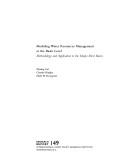| Listing 1 - 8 of 8 |
Sort by
|
Digital
ISBN: 9783642046155 9783642046261 9783642046148 9783642262210 Year: 2010 Publisher: Berlin, Heidelberg Springer
Abstract | Keywords | Export | Availability | Bookmark
 Loading...
Loading...Choose an application
- Reference Manager
- EndNote
- RefWorks (Direct export to RefWorks)
In recent years, a greater level of integration of the world economy and an opening of national markets to trade has impacted virtually all areas of society. The process of globalization has the potential to generate long-term benefits for developing countries, including enhanced technology and knowledge transfers and new fina- ing options supporting agricultural and economic development. However, risks of political and economic instability, increased inequality, and losses in agricultural income and production for countries that subsidize their agricultural and other e- nomic sectors threaten to offset potential benefits. Globalization can also have a profound impact on the water sector – in terms of allocation and use of water – and thus on food security as well. Other global change processes, particularly climate change, are also likely to have far-reaching impacts on water and food security, and societies around the world. To discuss these issues in-depth, the International Food Policy Research Institute, the Third World Centre for Water Management, Mexico, and the Tropical Agricultural Research and Higher Education Center (CATIE), Costa Rica, held a three-day International Conference on “Globalization and Trade: Implications for Water and Food Security,” at CATIE’s Turrialba, Costa Rica, headquarters under the auspices of the CGIAR Challenge Program on Water and Food in 2005. The workshop set out to identify the major risks and emerging issues facing developing countries related to global economic and environmental change impacts on water and food security.
Political philosophy. Social philosophy --- Environmental law --- Meteorology. Climatology --- Water supply. Water treatment. Water pollution --- Environmental protection. Environmental technology --- Production management --- waterbehandeling --- waterverontreiniging --- milieubeleid --- duurzame ontwikkeling --- milieurecht --- milieupolitiek --- klimaatverandering

ISBN: 0896291529 Year: 2006 Publisher: Washington International food policy research institute
Abstract | Keywords | Export | Availability | Bookmark
 Loading...
Loading...Choose an application
- Reference Manager
- EndNote
- RefWorks (Direct export to RefWorks)
Water resources development --- Watershed management --- Econometric models --- Econometric models --- Maipo River Watershed (Chile)
Book
ISBN: 3642046142 9786612833755 3642046150 1282833758 Year: 2010 Publisher: New York : Springer,
Abstract | Keywords | Export | Availability | Bookmark
 Loading...
Loading...Choose an application
- Reference Manager
- EndNote
- RefWorks (Direct export to RefWorks)
In recent years, a greater level of integration of the world economy and an opening of national markets to trade has impacted virtually all areas of society. The process of globalization has the potential to generate long-term benefits for developing countries, including enhanced technology and knowledge transfers and new fina- ing options supporting agricultural and economic development. However, risks of political and economic instability, increased inequality, and losses in agricultural income and production for countries that subsidize their agricultural and other e- nomic sectors threaten to offset potential benefits. Globalization can also have a profound impact on the water sector – in terms of allocation and use of water – and thus on food security as well. Other global change processes, particularly climate change, are also likely to have far-reaching impacts on water and food security, and societies around the world. To discuss these issues in-depth, the International Food Policy Research Institute, the Third World Centre for Water Management, Mexico, and the Tropical Agricultural Research and Higher Education Center (CATIE), Costa Rica, held a three-day International Conference on “Globalization and Trade: Implications for Water and Food Security,” at CATIE’s Turrialba, Costa Rica, headquarters under the auspices of the CGIAR Challenge Program on Water and Food in 2005. The workshop set out to identify the major risks and emerging issues facing developing countries related to global economic and environmental change impacts on water and food security.
Agriculture and state -- Environmental aspects. --- Climatic changes -- Environmental aspects. --- Climatic changes -- Political aspects. --- Crops and climate. --- Food supply -- Political aspects. --- Globalization -- Social aspects. --- Water resources development. --- Water-supply -- Political aspects. --- Water resources development --- Water-supply --- Food supply --- Climatic changes --- Globalization --- Agriculture and state --- Business & Economics --- Earth & Environmental Sciences --- Agriculture --- Agriculture - General --- Agricultural Economics --- Meteorology & Climatology --- Political aspects --- Social aspects --- Environmental aspects --- Climatic changes. --- Food supply. --- Globalization. --- Sustainable development. --- Water-supply. --- Food control --- Changes, Climatic --- Climate change --- Climate changes --- Climate variations --- Climatic change --- Climatic fluctuations --- Climatic variations --- Global climate changes --- Global climatic changes --- Availability, Water --- Water availability --- Water resources --- Development, Sustainable --- Ecologically sustainable development --- Economic development, Sustainable --- Economic sustainability --- ESD (Ecologically sustainable development) --- Smart growth --- Sustainable development --- Sustainable economic development --- Global cities --- Globalisation --- Internationalization --- Environment. --- Environmental management. --- Climate change. --- Environmental law. --- Environmental policy. --- Water pollution. --- Climate Change. --- Water Policy/Water Governance/Water Management. --- Waste Water Technology / Water Pollution Control / Water Management / Aquatic Pollution. --- Environmental Law/Policy/Ecojustice. --- Sustainable Development. --- Economic development --- Natural resources --- Public utilities --- Water utilities --- International relations --- Anti-globalization movement --- Produce trade --- Food security --- Single cell proteins --- Climatology --- Climate change mitigation --- Teleconnections (Climatology) --- Changes in climate --- Climate change science --- Global environmental change
Book
ISBN: 9783642046155 9783642046261 9783642046148 9783642262210 Year: 2010 Publisher: Berlin, Heidelberg Springer Berlin Heidelberg
Abstract | Keywords | Export | Availability | Bookmark
 Loading...
Loading...Choose an application
- Reference Manager
- EndNote
- RefWorks (Direct export to RefWorks)
In recent years, a greater level of integration of the world economy and an opening of national markets to trade has impacted virtually all areas of society. The process of globalization has the potential to generate long-term benefits for developing countries, including enhanced technology and knowledge transfers and new fina- ing options supporting agricultural and economic development. However, risks of political and economic instability, increased inequality, and losses in agricultural income and production for countries that subsidize their agricultural and other e- nomic sectors threaten to offset potential benefits. Globalization can also have a profound impact on the water sector - in terms of allocation and use of water - and thus on food security as well. Other global change processes, particularly climate change, are also likely to have far-reaching impacts on water and food security, and societies around the world. To discuss these issues in-depth, the International Food Policy Research Institute, the Third World Centre for Water Management, Mexico, and the Tropical Agricultural Research and Higher Education Center (CATIE), Costa Rica, held a three-day International Conference on Globalization and Trade: Implications for Water and Food Security, at CATIE's Turrialba, Costa Rica, headquarters under the auspices of the CGIAR Challenge Program on Water and Food in 2005. The workshop set out to identify the major risks and emerging issues facing developing countries related to global economic and environmental change impacts on water and food security.
Political philosophy. Social philosophy --- Environmental law --- Meteorology. Climatology --- Water supply. Water treatment. Water pollution --- Environmental protection. Environmental technology --- Production management --- waterbehandeling --- waterverontreiniging --- milieubeleid --- duurzame ontwikkeling --- milieurecht --- milieupolitiek --- klimaatverandering

ISBN: 0896297497 Year: 2005 Publisher: Washington International food policy research institute
Abstract | Keywords | Export | Availability | Bookmark
 Loading...
Loading...Choose an application
- Reference Manager
- EndNote
- RefWorks (Direct export to RefWorks)
Book
ISBN: 1351747622 1315189941 Year: 2019 Publisher: New York : Routledge,
Abstract | Keywords | Export | Availability | Bookmark
 Loading...
Loading...Choose an application
- Reference Manager
- EndNote
- RefWorks (Direct export to RefWorks)
"This book is the first comprehensive effort to bring together Water, Food Security and Nutrition (FSN) in a way that goes beyond the traditional focus on irrigated agriculture. Apart from looking at the role of water and sanitation for human wellbeing, it proposes alternative and more locally appropriate ways to address complex water management and governance challenges from the local to global levels against a backdrop of growing uncertainties. The authors challenge mainstream supply-oriented and neo-Malthusian visions that argue for the need to increase the amount of land under irrigation in order to feed the world's growing population. Instead, they argue for a reframing of the debate concerning production processes, waste, food consumption and dietary patterns whilst proposing alternative strategies to improve water and land productivity, putting the interests of marginalised and disenfranchised groups upfront. The book highlights how accessing water for FSN can be challenging for small holders, vulnerable and marginalized women and men, and how water allocation systems and reform processes can negatively affect local people's informal rights. The book argues for the need to improve policy coherence across water, land and food and is original in making a case for strengthening the relationship between the human rights to water and food, especially for marginalised women and men. It will be of great interest to practitioners, students and researchers working on water and food issues"--
Book

ISBN: 9780812294217 Year: 2017 Publisher: Philadelphia
Abstract | Keywords | Export | Availability | Bookmark
 Loading...
Loading...Choose an application
- Reference Manager
- EndNote
- RefWorks (Direct export to RefWorks)
Digital

ISBN: 9780812294217 Year: 2017 Publisher: Philadelphia, Pa University of Pennsylvania Press
Abstract | Keywords | Export | Availability | Bookmark
 Loading...
Loading...Choose an application
- Reference Manager
- EndNote
- RefWorks (Direct export to RefWorks)
| Listing 1 - 8 of 8 |
Sort by
|

 Search
Search Feedback
Feedback About UniCat
About UniCat  Help
Help News
News